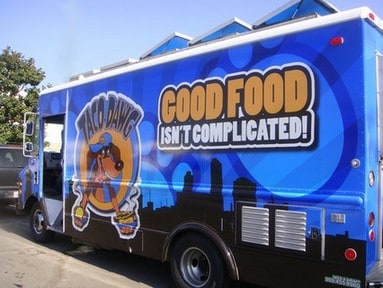On a somewhat chilly Thursday evening, AOL Small Business reports that a group of young college students have driven 10 miles because of a tweet.
Their destination: a bar in Costa Mesa. Or, to be more specific, a food truck parked outside a bar in Costa Mesa.
Their goal: the nachos served by Taco Dawg, an up-and-coming food truck that specializes in a unique mix of hot dogs and tacos with a few distinct sides like fried mac ‘n’ cheese.
Like many new gourmet food trucks on the scene in Los Angeles, New York City, Nashville, and Austin, Texas, and other towns, this one’s got foodie cred: The menu was developed by classically trained chef Todd Mosher and includes tacos with homemade salsas and hot dogs with custom baked buns.
Customer favorites veer toward fusion items like the Texan, a taco that includes bacon, tex-mex sauce and crispy fried onions, and the Taco Dawg, a hot dog topped with taco staples like taco meat, sour cream and pico de gallo.
While the trend of food trucks is just getting started in some cities, with chefs and entrepreneurs gaining awareness among local foodies and navigating local laws to get licensed and find locations, many existing food truck operators have their sights set on a future in a brick-and-mortar location.
“Many of the food truck operators I talked to hoped to open a restaurant, but they couldn’t get a loan in this economic climate,” says Jennings. “Some are highly trained chefs who are victims of layoffs.
Launching a truck is a more affordable way to test the waters with a food concept. It remains to be seen, however, whether truck operators will be able to successfully transfer their audience to a brick-and-mortar location.”
Photo by yelp.com.
